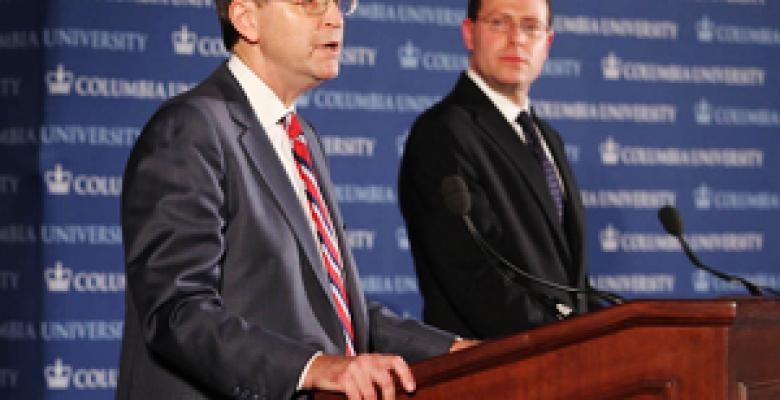Presidential Economic Advisers Square Off in Low Library Debate

Debate season isn’t confined to television screens as the presidential campaign hurtles to Election Day. Columbia representatives of President Barack Obama (CC’83) and former Massachusetts Gov. Mitt Romney are going toe-to-toe making their candidates’ case for election.
On Oct. 8 in Low Library’s Rotunda, Columbia Business School Dean R. Glenn Hubbard, a senior economic adviser to Romney, debated Harvard Professor Jeffrey Liebman, his counterpart in the Obama campaign. And on Oct. 23, campaign surrogates will hold a similar debate on health policy at Columbia University Medical Center.
President Lee C. Bollinger opened the economic forum by reminding the audience of Columbia’s history of advising government leaders, Democrats and Republicans alike. “Despite these differences, all have shared the certain knowledge that the field of economics and its relevance to our country reach far beyond statistical measures of wealth and poverty or forecasts of economic growth and extend to fundamental questions about the kind of society we choose,” Bollinger said.
First up was Hubbard, who lambasted the Obama administration’s economic policies. “The White House has an uncompetitive tax code, it’s given short shrift to free trade and has promoted an anti-growth regulatory climate,” said Hubbard. “All in all, we’re stuck in a very bad neighborhood.”
For his part, Liebman said that while Hubbard has been one of his role models for an economic adviser, he wants to see that Hubbard “doesn’t get another chance” to return to the White House. (Hubbard served in the administrations of the last two Republican presidents, as a deputy assistant Treasury secretary under George H.W. Bush and chairman of the Council of Economic Advisers for George W. Bush.) “Romney wants to go back to the trickle-down approach of past decades, cutting taxes for the wealthy and getting government out of the way,” said Liebman. “He thinks everything else will take care of itself. President Obama, on the other hand, believes you build an economy from the bottom up.”
The debate—which was co-sponsored by Columbia’s Program for Economic Research, the Center on Global Economic Governance and the Committee on Global thought—showcased two different schools of thought about the government’s role in the economy. Hubbard champions the low-tax, free-market ideas of economists like Milton Friedman. Liebman represents the belief of economist John Maynard Keynes that it’s the responsibility of government to spur an economy by closely overseeing fiscal policy and spending. The Columbia forum mirrored dominant themes on the campaign trail, with Hubbard demanding to know why Obama’s stimulus spending didn’t do more to improve the economy. Liebman countered that the president inherited huge deficits from his predecessor and that Republicans blocked a centerpiece of his efforts, the American Jobs Act, in Congress last year.
The global editor-at-large at Reuters, Chrystia Freeland, moderated the debate, which included questions from a distinguished panel of three Columbia professors: Nobel laureate Joseph Stiglitz, the University Professor at the Business School, Economics Department and School of International and Public Affairs; Michael Woodford, the John Bates Clark Professor of Political Economy; and Sharyn O’Halloran, the George Blumenthal Professor of Political Science and International and Public Affairs.
Some of the most entertaining parts of the debate came from Stiglitz’s questions to Hubbard. Stiglitz, the former chairman of the Council of Economic Advisers under President Bill Clinton, noted that median income in the United States is lower now than it was 10 years ago. Would keeping Bush-era tax cuts to millionaires help the country’s middle class, he asked, or would ending the cuts help the economy?
“Your questioning is too subtle, Joe. I can’t quite figure out what you’re getting at,” responded Hubbard, an avid proponent of the Bush-era tax cuts, to a great deal of laughter. Hubbard said the cuts encouraged economic growth, and the economy would do better if education and training stimulus packages were repurposed in the form of block grants to states.
Noting that middle class incomes have been falling for the past decade, Liebman said it was the task of the federal government to do what it could to see that economic prosperity is shared. “The president is sensitive to what the middle class is going through,” he said. “What we need is a lasting solution that sees rising middle class wages.”
Hubbard and Liebman also debated the merits of the Dodd-Frank Act, which cracked down on Wall Street and strengthened consumer financial protection. Liebman argued that Dodd-Frank has successfully prevented banks from reckless proprietary trading practices. “Moving back to the old system is not the solution,” he said.
But Hubbard criticized Dodd-Frank for not adequately addressing specific banking activities. “Dodd-Frank reminds me of the game show 'Jeopardy!,'” said Hubbard. “If Dodd-Frank is the answer, then what is the question?”